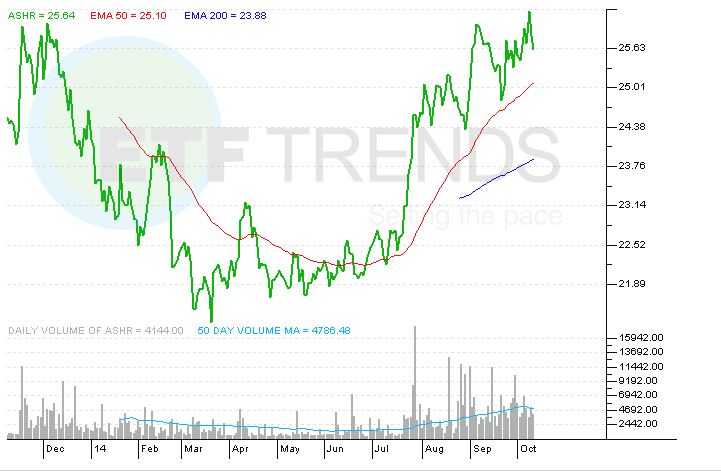A Dilemma for A-Shares ETFs
The Deutsche X-trackers Harvest CSI 300 China A-Shares Fund (ASHR) has pulled in $233.million of its nearly $478 million in assets under management this year.
Over the past 90 days, the largest U.S.-listed ETF offering exposure to stocks on mainland China has surged 14.1% while the iShares China Large-Cap ETF (FXI) , the largest China ETF of any type trading in the U.S., has notched a small loss. However, those are not the most compelling issues facing ASHR.
Amid robust demand, Deutsche Asset & Wealth Management last month was forced to limit creations of new shares in ASHR and the Deutsche X-trackers Harvest CSI 500 China A-Shares Small Cap Fund (ASHS) because investor demand for those ETFs, ASHR in particular, was forcing the funds to bump up against their respective Renminbi Qualified Foreign Institutional Investor (RQFII), which allows the funds to purchase A-shares equities. [Strong Demand Forces Limited Creations in A-Shares ETFs]
DAWM announced it would “accept one creation unit, comprised of 50,000 shares, each day per fund.” The issuer’s “dilemma highlights what’s likely to become an increasingly common predicament as fund providers from BlackRock Inc. to CSOP Asset Management Ltd. look to follow suit and open up China’s more than $4 trillion A-shares market to U.S. ETF investors,” reports Boris Korby for Bloomberg.
Deutsche and Harvest Global Investments, China’s second-largest asset manager and the sub-advisor on ASHR and ASHS, are working with “Chinese authorities to obtain an increase in RQFII quota to keep in-line with investor demand,” according to a statement issued by the German banking giant last month.
Some relief for expanded RQFII quotas is on the way. In late September, Chinese regulators accelerated expansion of the RQFII quota regime, adding $2.5 billion to it to bring the total outstanding quota to $62.2 billion. [RQFII Expansion Helps A-Shares ETFs]
Due to restrictions on foreign ownership of A-shares, China is far behind other large markets, both developed and emerging, in terms of foreign ownership of its equities. Even including Chinese stocks listed in Hong Kong or New York, foreign ownership of Chinese stocks was just 11.4% at the end of 2012, half the level seen in Japan and barely more than 20% of foreign ownership of German stocks.
ASHS, the small-cap A-shares ETF, has gained nearly 4% since Sept. 12, the day after DAWM announced creations in the fund would be limited. Since that day, ASHS has taken in nearly half its almost $17 million in assets under management. The ETF debuted in May.
Increased interest in A-shares ETFs appears well-timed and comes as more investors on mainland China are gobbling up local stocks. “The one-month average market participation rate has risen sharply to almost a three-year high for both Shanghai and Shenzhen,” said HSBC in a note posted last week by Barron’s.
Deutsche X-trackers Harvest CSI 300 China A-Shares Fund

